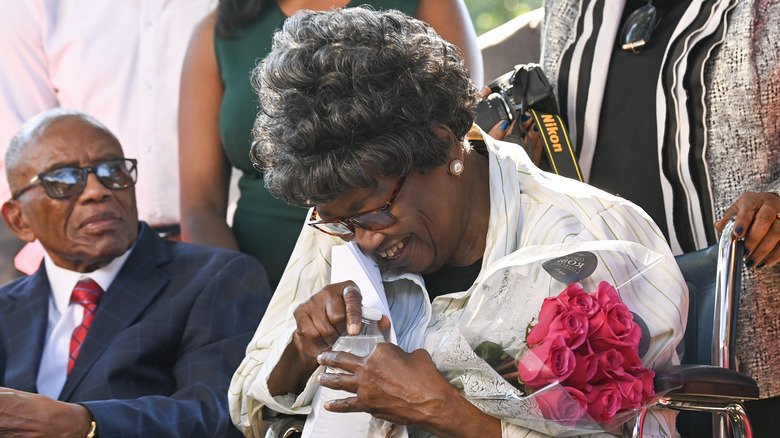Claudette Colvin: The Untold Truth Of The Civil Rights Pioneer
One of the key figures in the civil rights movement, and a woman whose name is remembered decades after she entered the public consciousness, is Rosa Parks. On December 5, 1955, Parks, a Black woman, famously refused to move to the back of a Montgomery, Alabama, bus to make room for a white passenger, as the law required at the time. The act of defiance sparked the Montgomery bus boycott, one of the multiple dominoes that would eventually fall as the civil rights movement broke down segregation and injustice, piece by piece.
What you may not know is that a few months before Rosa Parks got the ball rolling in Montgomery, another Black woman also steadfastly refused to move to the back of the bus for a white passenger. Claudette Colvin, a teenager at the time, was removed from a bus in handcuffs, and then was promptly forgotten about in the annals of civil rights history. In December 2021, as CNN reported, authorities expunged the criminal record that Colvin had carried her entire life due to one act of defiance as a teenager.
Activists were planning a bus boycott
You may think that the Montgomery bus boycott happened organically, following the spontaneous refusal of Parks to move to the back of the bus. In fact, as David Garrow, a historian and the author of "Bearing the Cross: Martin Luther King Jr. and the Southern Christian Leadership Conference," explains via NPR News, that the NAACP had been planning to launch a boycott of the city's bus system for years.
Indeed, the matter of Black passengers being mistreated on Montgomery buses, or buses elsewhere across the South, wasn't limited to just being required to move to the back of the bus for white passengers. According to the Oxford Encyclopedia of Women, it was also not uncommon for Blacks on Southern buses to be shortchanged, ordered off the bus at random locations and stranded after paying their fares, or even assaulted by other passengers and/or drivers. Colvin herself would later say that the driver of her bus repeatedly called her a "thing."
Claudette Colvin was learning about racial injustice
Hours before she would be arrested for refusing to move to the back of the bus for a white passenger, the 15-year-old was in her segregated school learning about the injustices that had plagued Blacks for centuries in the U.S., and that still bedeviled the community at the time. As NPR News reports, it was Negro History Month, and Claudette and her class had been learning about Sojourner Truth, Harriet Tubman, and other great Black leaders. "We couldn't try on clothes. You had to take a brown paper bag and draw a diagram of your foot ... and take it to the store," she said.
As CBS News reports, on that day, Colvin and her friends were seated together in a row when a white woman demanded that they move to make room for her. She refused, saying that the memories of Tubman and Truth were holding her in her place. "I said I could not move because history had me glued to the seat ... Harriet Tubman's hands were pushing me down on one shoulder, and Sojourner Truth hand was pushing me down on the other shoulder," she said.
Claudette's arrest was harrowing
After refusing to move to the back of the bus for a white passenger, the bus driver flagged down a passing police officer to arrest Colvin, CBS News reports. He boarded the bus and asked the 15-year-old why she refused to move, and she insisted that remaining in her seat was her constitutional right. A few stops later, another officer boarded, and the teen was in handcuffs. She says that the cops "manhandled" her, and that she may have accidentally scratched one of them due to her long fingernails, leading to a charge of assaulting a police officer.
On the ride to jail, Colvin says that cops ridiculed her, called her racial slurs, and made inappropriate remarks about her body, according to NPR News. She also notes that she was taken not to the juvenile detention facility, but to adult jail. "I recited the Lord's Prayer and the Twenty-third Psalm over and over in my head, trying to push back the fear," she said.
Colvin would be charged with three crimes, but only the charge of assaulting a police officer stuck, according to CBS News. That incident would stay on her record for the next six and a half decades.
Colvin wasn't chosen as the face of a bus boycott
If the NAACP had been angling for a reason to invoke a boycott of the Montgomery bus system, and if an innocent Black teenager had been victimized by the system, then why wasn't Claudette Colvin's experience the spark that started the boycott? Why did activists wait until several months later, when Rosa Parks did the same thing?
In fact, Colvin wasn't even the first Black woman in Montgomery to refuse to give up her seat. To make a long story short, the community needed the right person to be the face of the movement, and Parks fit the bill, as she told NPR News. "Her skin texture was the kind that people associate with the middle class. She fit that profile," Colvin said of Park. Colvin herself was a teenager, and the NAACP didn't think that a teen would be the right face of the movement.
Though it wasn't her story that sparked the Montgomery bus boycott, Colvin was involved, however obliquely, in the saga. She was a plaintiff — indeed, the only female plaintiff – in Browder v. Gayle, the legal case that eventually led to bus segregation laws in Montgomery, and Alabama generally, being outlawed.
Claudette Colvin's criminal record was expunged
Following her arrest, Claudette Colvin promptly disappeared from the annals of civil rights history, overshadowed by the narrative of Rosa Parks. She eventually moved to New York City, according to NPR News, and by that time, the conversation about civil rights had turned from segregation to larger issues such as Black enterprises and Black power. She worked as a nurse's aide, had children, and continued to work as a civil rights activist.
In 2021, according to CNN, she petitioned the courts to have her criminal record expunged. Montgomery County Juvenile Judge Calvin Williams agreed with her plea, and ordered the records of Colvin's arrest, 66 years earlier, destroyed. He noted that the teenager's actions that day were "a courageous act on her behalf and on behalf of a community of affected people."
As for Colvin, she says that having her name cleared legally six and a half decades after the fact is progress, in its own way. "When I think about why I'm seeking to have my name cleared by the state, it is because I believe if that happened, it would show the generation growing up now that progress is possible and things do get better. It will inspire them to make the world better," she said.





